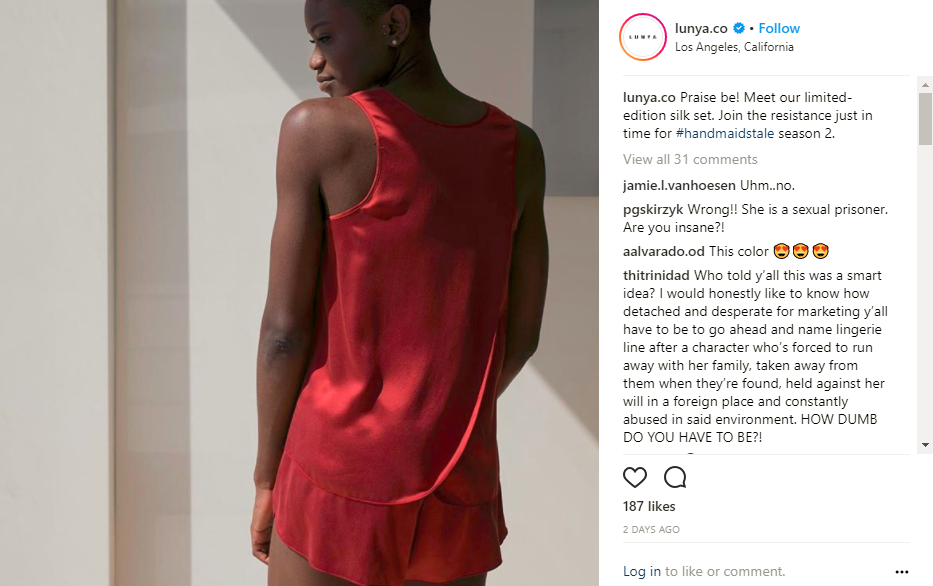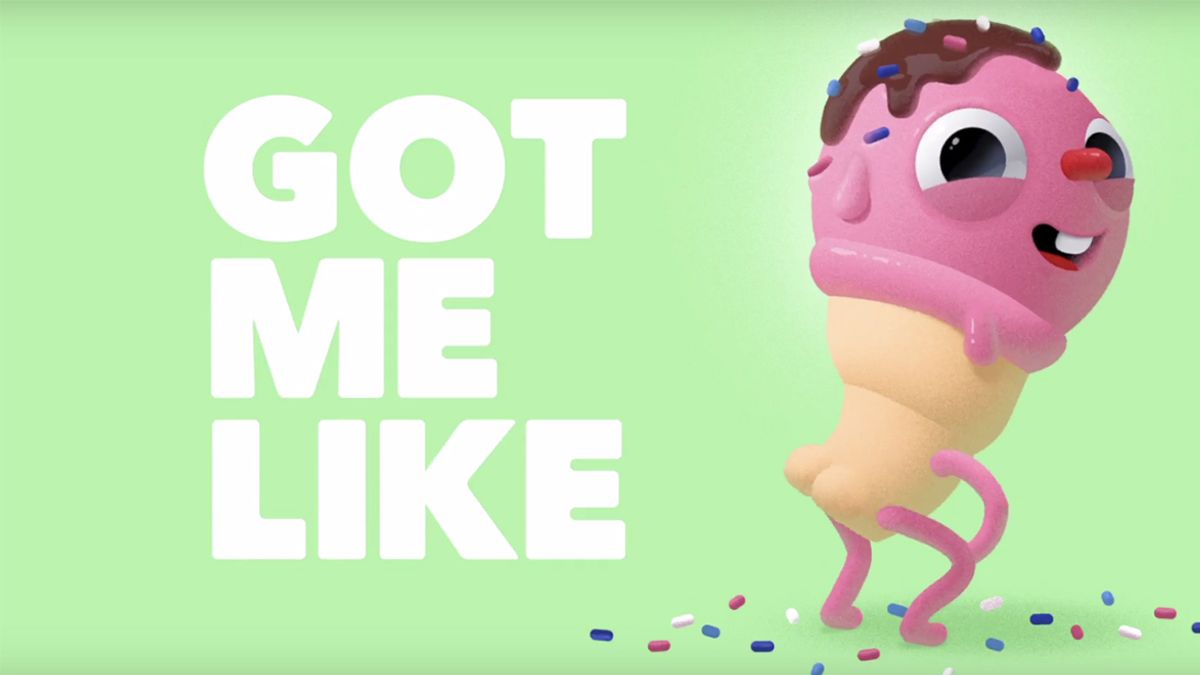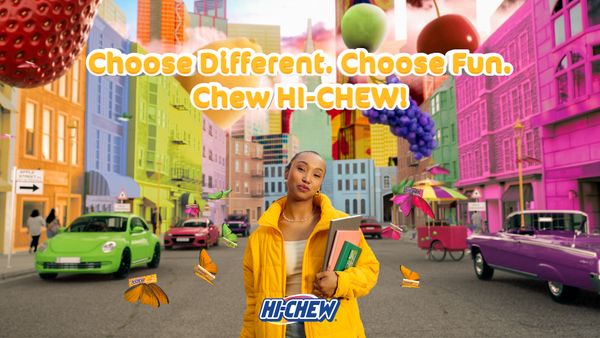Campaign Trail is our look at some of the best and worst new creative efforts from the marketing world.
Our editors' picks this week for the most notable marketing efforts are sure to inspire a range of emotions: outrage at a ridiculous attempt to tap into the popularity of Hulu's "The Handmaid's Tale"; smiles from a sparkly campaign about ice cream; and potentially some tears as well for an effort spotlighting LBGT discrimination:
Lunya's 'Offred' silk pajamas: The tale of a pun come undone
The rundown: Sleepwear brand Lunya is calling on Hulu's popular science-fiction drama "The Handmaid's Tale" to promote a limited-edition $178 silk pajama set in a shade of red it is calling "Offred" — the name given to the show's main character once she becomes the property and sexual slave of a family in a dystopian future.
With interest in the show heating up ahead of its second season debut on April 25, Lunya sent an email to customers earlier this week announcing the product's availability and who it is named after, Gizmodo reported. The company also took to Instagram to encourage fans to "join the resistance" — a reference to those fighting back against the oppressive society depicted in the show. As of press time, the Offred shade was not available on the company's website.
The results: Ok, so clever wordplay is a tenet of marketing. But, just because you can make a pun — Lunya's founder and CEO told Huffington Post that its Offred shade is play on how the color itself is off-red — it doesn't mean you should.
"The Handmaid's Tale" mostly succeeds at raising thought-provoking and meaningful questions about women's identity in a society where they are subjugated and the heavy cost that can come from fighting back. The themes and seriousness of the show make it a poor match for a marketing tie-in with a company whose photography regularly features sexy images of scantily clad women. In the show, Offred also wears red to indicate she is the property of someone.

The resoundingly negative response from Instagram users and the media points to the dangers inherent for marketers when they try to ride the coattails of a social issue that is out of tune with a brand's image. McDonald's recently fell into a similar trap when it flipped its iconic Golden Arches sign so it looked like a "W" instead of an "M" in recognition of International Women's Day, a move that quickly resulted in backlash based on the chain's reputation for how it has treated its female workers.
A growing body of research points to the need for marketers to have a greater purpose if they want to connect with younger consumers but also the importance for authenticity, where the purpose matches the brand's culture. In the case of the latter, Lunya's promotion is a clear fail.
—Chantal Tode
Baskin-Robbins twerks its way into the meme spotlight
The rundown: Baskin-Robbins, the 73-year-old ice cream brand, is embracing online meme culture of the moment with more than 50 animations and clips that include a dancing man and booty-shaking cartoon cone, according to Adweek. The campaign also comes with the tagline "Baskin-Robbins Got Me Like," which plays off a viral internet photo.
The colorful imagery and upbeat club music featured in Baskin-Robbins' latest effort help weave the joy of an ice cream outing into the brand's messaging, Dave Nagel, senior director of consumer engagement, told Adweek. TV spots will air on A&E, AMC, BET, Comedy Central, Food Network and FX, with digital video running on Hulu, Snapchat, Instagram, Tinder, Pandora and Spotify.
More than 25 GIFs from the campaign, which was developed with agency 22square and content studio Psyop, will be featured on mobile platform Tenor as well, according to The Drum.
The results: There's often something cringe-worthy about brands trying too hard to get hip with the kids, but Baskin-Robbins seems to have found a sweet spot. The ice cream company is clearly trying to embrace what's popular with younger consumers like Gen Z and millennials as it looks to shift past its legacy "31 flavors" messaging.
Beyond tapping into language and imagery that's popular online, Baskin-Robbins is also experimenting with some more nascent formats that are starting to win over marketers' favor such as GIFs, which are highly-shareable and well-suited to meme culture. The brand is marketing its latest efforts on some less traditional platforms as well, including the millennial-focused dating app Tinder — also recently host to campaigns from Travelocity and Dunkin' Donuts — and the GIF-sharing service Tenor, which was purchased by Google late last month.
This push marks a shift away from Baskin-Robbins' purely product-focused advertisements of the past and toward a strategy that taps into the emotions associated with splurging on ice cream — namely having fun.
—Natalie Koltun
Ad Council reminds people the fight for LGBT rights doesn't end at marriage
The rundown: The U.S. Supreme Court legalizing gay marriage in June 2015 undoubtedly marked a landmark moment for LGBT rights. But for those not part of the community, it could feel like a long-fought battle was won and over, while the reality is that achieving equality remains a long way off, with 55% of lesbian, gay, bisexual and transgender people reporting having been discriminated against in the past year.
That's the animating force behind "Beyond I Do," a new campaign from the Ad Council highlighting ongoing prejudice against LGBT people, especially in 31 states where it's still possible to be fired, evicted or denied service due to sexual orientation or gender identity. Twenty-eight states provide no explicit protections for employment, housing and public accommodation based on these factors, and three provide incomplete protections, according to data on the campaign's website.
The Ad Council is promoting the effort, done in partnership with The Gill Foundation, the agency CP+B and Red Scout, via an interactive map of the U.S. calling out the states where discriminatory policies against LGBT people still exist, along with stories and audio clips from couples in living some of those areas. The campaign is supported by print, TV, radio and digital video.
The results: The Ad Council is sending a powerful message about how progress on the LGBT front continues to be a hard-fought battle, including instances when children are denied simple but essential services like doctor's visits due to having gay parents.
The push includes elements common in many PSA-style campaigns, like TV and digital video ads built on a strong emotional core, but also some less traditional media like the microsite, data visualization and an interactive storytelling map. These bring in an educational component that fits into the type of richer, informational content marketing today's consumers are increasingly demanding and frequently engage with.
Better recognizing ongoing discrimination and a lack of legal safety nets for many LGBT consumers in the U.S. comes at a time when marketers are also potentially seriously undeserving the segment. Roughly half of marketers allocate between 0% and 4% of their campaigns on LGBTQ consumers each year despite the group having more than $5 trillion in global spending power, according to a recent study by Brand Innovators and INTO, Grindr's digital lifestyle magazine.
—Peter Adams





















